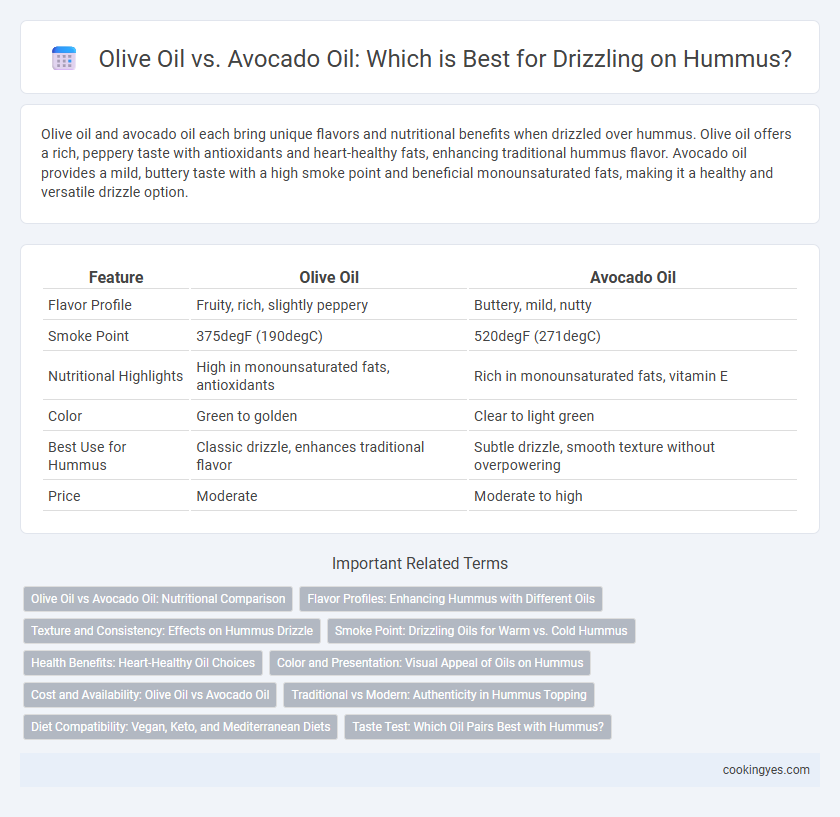Olive oil and avocado oil each bring unique flavors and nutritional benefits when drizzled over hummus. Olive oil offers a rich, peppery taste with antioxidants and heart-healthy fats, enhancing traditional hummus flavor. Avocado oil provides a mild, buttery taste with a high smoke point and beneficial monounsaturated fats, making it a healthy and versatile drizzle option.
Table of Comparison
| Feature | Olive Oil | Avocado Oil |
|---|---|---|
| Flavor Profile | Fruity, rich, slightly peppery | Buttery, mild, nutty |
| Smoke Point | 375degF (190degC) | 520degF (271degC) |
| Nutritional Highlights | High in monounsaturated fats, antioxidants | Rich in monounsaturated fats, vitamin E |
| Color | Green to golden | Clear to light green |
| Best Use for Hummus | Classic drizzle, enhances traditional flavor | Subtle drizzle, smooth texture without overpowering |
| Price | Moderate | Moderate to high |
Olive Oil vs Avocado Oil: Nutritional Comparison
Olive oil is rich in monounsaturated fats, particularly oleic acid, and contains antioxidants like vitamin E and polyphenols, which support heart health and reduce inflammation. Avocado oil also provides high levels of monounsaturated fats and vitamin E but offers a higher smoke point, making it more stable when heated and slightly richer in lutein, an antioxidant beneficial for eye health. Both oils enhance hummus with healthy fats, though olive oil is traditionally preferred for its robust flavor and established cardiovascular benefits.
Flavor Profiles: Enhancing Hummus with Different Oils
Olive oil offers a rich, fruity, and slightly peppery flavor that enhances traditional hummus, adding depth and authenticity to the dish. Avocado oil provides a milder, buttery, and creamy taste that complements hummus with a subtle, smooth finish without overpowering the chickpea base. Choosing between olive oil and avocado oil depends on whether a robust Mediterranean profile or a more neutral, velvety texture is desired for drizzling.
Texture and Consistency: Effects on Hummus Drizzle
Olive oil enhances hummus drizzle with a rich, slightly peppery flavor and smooth, silky texture that complements the creamy base. Avocado oil provides a milder taste with a buttery, less viscous consistency, allowing for a lighter, more fluid drizzle. Choosing olive oil results in a thicker, more luxurious finish, while avocado oil offers a delicate, easily spreadable texture.
Smoke Point: Drizzling Oils for Warm vs. Cold Hummus
Olive oil, with a smoke point around 375degF (190degC), is ideal for drizzling on cold hummus as it preserves its rich, fruity flavor without burning. Avocado oil, boasting a higher smoke point near 520degF (271degC), suits warm hummus or recipes requiring heat, preventing the oil from smoking and maintaining a smooth texture. Choosing the right oil enhances the hummus experience by balancing flavor integrity and temperature compatibility.
Health Benefits: Heart-Healthy Oil Choices
Olive oil, rich in monounsaturated fats and antioxidants, supports cardiovascular health by reducing inflammation and lowering bad cholesterol levels. Avocado oil also contains heart-healthy monounsaturated fats and vitamin E, promoting healthy cholesterol balance and improving blood vessel function. Both oils offer anti-inflammatory properties, but extra virgin olive oil provides higher antioxidant levels, enhancing its heart-protective effects when drizzled on hummus.
Color and Presentation: Visual Appeal of Oils on Hummus
Olive oil offers a rich golden hue that enhances the traditional creamy beige of hummus, creating a classic and appetizing presentation. Avocado oil, with its lighter, greenish tint, provides a modern and vibrant contrast that can elevate the visual appeal of hummus dishes. Choosing between olive oil and avocado oil for drizzling depends on desired color impact and overall plating aesthetics.
Cost and Availability: Olive Oil vs Avocado Oil
Olive oil is widely available and typically more affordable than avocado oil, making it the preferred choice for drizzling on hummus in most markets. Avocado oil tends to be pricier due to its extraction process and limited supply, which can affect its accessibility for everyday use. Cost efficiency and ease of purchase make olive oil a practical option for enhancing hummus flavor without compromising budget constraints.
Traditional vs Modern: Authenticity in Hummus Topping
Olive oil, a cornerstone of traditional hummus, offers a rich, peppery flavor that enhances authenticity and complements the creamy texture of chickpeas. Avocado oil provides a modern twist with its mild, buttery taste and higher smoke point, appealing to health-conscious consumers seeking a subtler topping. Choosing between olive oil and avocado oil for hummus drizzling reflects a balance between honoring culinary heritage and embracing contemporary flavor preferences.
Diet Compatibility: Vegan, Keto, and Mediterranean Diets
Extra virgin olive oil is the traditional choice for drizzling hummus, aligning perfectly with vegan, keto, and Mediterranean diets due to its high monounsaturated fats and antioxidant content. Avocado oil offers a mild flavor and a similar nutrient profile, making it an excellent alternative for those seeking a keto-friendly, heart-healthy drizzle rich in oleic acid and vitamin E. Both oils support the Mediterranean diet's emphasis on healthy fats while fitting well within vegan and low-carb keto restrictions.
Taste Test: Which Oil Pairs Best with Hummus?
Olive oil enhances hummus with its rich, peppery flavor and fruity undertones, creating a classic Mediterranean taste that complements the creamy texture. Avocado oil offers a milder, buttery flavor with a subtle nuttiness, resulting in a smoother, less robust profile that allows the tahini and chickpeas to shine. Taste tests consistently show olive oil as the preferred drizzle for its balanced, aromatic complexity, while avocado oil suits those seeking a softer, more neutral finish.
Olive Oil vs Avocado Oil for Hummus Drizzle Infographic

 cookingyes.com
cookingyes.com